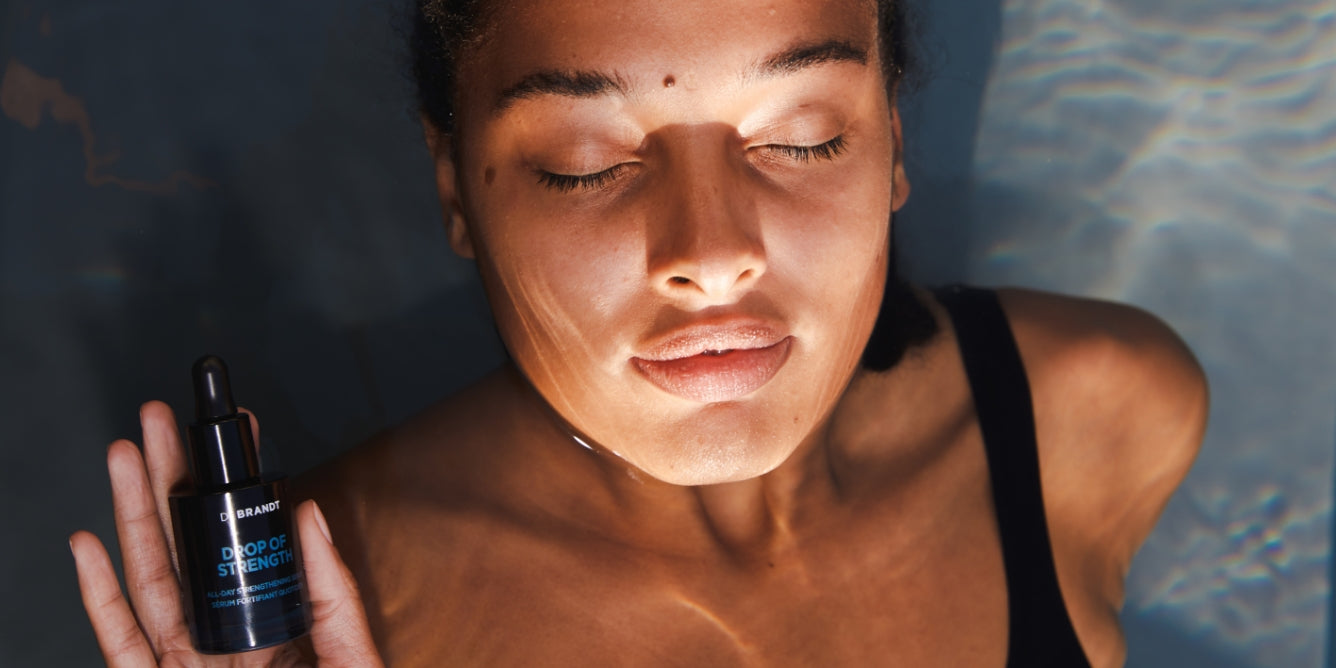
If you consider your skin type to be oily, blemish-prone or even combination, you might be inclined to choose a daily moisturizer that states “oil-free” nice and big on the front of the box. But are you one-hundred percent sure that an oil-free face cream is what’s best for you? Do you even really know what “oil-free” means (some oils are actually good for our skin) and is an oil-free product right for you? Dr. Shasa Hu, board certified dermatologist and member of our Skin Advisory Board, helps us break down the basics on oil-free skincare.
Moisturizers refer to a wide range of skin care products designed to improve hydration and moisture of the face, body, eyes, hands and feet. Moisturizers can be in the form of lotions, creams, serums, oils or gels. The primary benefit of a moisturizer is to restore skin hydration and improve skin texture so that skin feels soft and smooth. Moisturizers are absolutely essential for people that want to get rid of dry skin, or other chronic skin diagnoses such as atopic dermatitis or ichthyosis where the skin barrier is often compromised, leading to dry, itchy, red or ashy skin.
Most moisturizers contain moisturizing ingredients, emulsifiers, polymers/ thickeners, sensory modifiers, and preservatives. The moisturizing ingredients often include various oils, glycerin, lipids, ceramides, hyaluronic acids and squalene. Palm, coconut, olive, plant oils, lanolin, and mineral oils are very nourishing for dry skin, especially for the more stubborn patches on our body, such as hands, feet, elbows and knees. The thicker the vehicle and higher the content of oils and lipids, usually correlates with better efficacy to hydrate skin and repair the skin barrier. The oils also add an occlusive benefit to the moisturizer by decreasing transepidermal water loss. The flip side is that there may be concerns of these oils occluding pores, leading to acne and breakouts in people with acne prone skin. Additionally, facial moisturizers in ointment or cream formulation may feel too greasy or impart too much shine in people with oily skin. By removing the oils, keeping just hydrating emollients such as ceramides, hyaluronic acids, and lipid alcohols, a moisturizer becomes “oil-free”. Most skin care experts would agree that oil-free moisturizer is more appropriate for those with already oily, combination skin or acne prone skin. Oil-free moisturizers are also lighter, easier to spread, and leave minimal shine on the skin, therefore, better for layering when a person already tends to get shiny T-zone by midday, after washing their face in the morning.
Are oil free moisturizers good for oily skin and acne-prone skin?
One of the biggest misconceptions is that oily skin or acne prone skin should avoid moisturizer. On the contrary, using a light oil free moisturizer can actually help to regulate oil production by sending signals to our oil glands (sebaceous glands) that the surface skin cells are well hydrated, so that the natural sebum production will be tempered. Skipping moisturizer or over-drying the skin with harsh cleansers or scrubs can lead to a rebound effect: excessive oil production occurs as our skin tries to rebalance itself. When people start acne treatments or any other topical skin care products containing retinol, AHA, BHA that increases cell turnover and renewal, it is even more important to incorporate an oil free moisturizer in their daily routine to avoid over-drying of the skin. For example, when people start a topical retinol or tretinoin for acne, retinoids often worsen barrier dysfunction and increase transepidermal water loss before the skin cells adjust to the effects of the retinoid. This is why a lot of people give up using retinoids when they experience redness, dry patches and look worse at the beginning. Incorporating a light moisturizer will minimize that initial skin irritation, protect the skin barrier and, in the long run, complement the benefits of topical retinoids on the skin. Dermatologists often recommend oil free and non-comedogenic moisturizers in the form of lotion or hydrogel for people starting acne therapy. These moisturizers hydrate the skin with ingredients such as ceramides, hyaluronic acid, lipid alcohols and squalene but won’t clog pores, leave greasy residue or worsen oil production. For people with sensitive and acne prone skin, fragrance-free and hypoallergenic moisturizers would be more appropriate options, because fragrance is the top allergen in people with a history of contact dermatitis.

Are oil free moisturizers better?
Oil free moisturizers are not necessarily “better” than the other moisturizers, because the end result of a moisturizer is affected by the user’s skin type and needs. For most people with acne/blemish prone skin or oily skin, oil free moisturizers are preferred because that’s all they need: a light hydration to maintain the skin barrier. For people with impaired skin barriers, mature skin, dry skin, or inflamed skin, a richer moisturizer with higher contents of lipids, plant oils (e.g. jojoba oil, palm oil, coconut oil), mineral oil or petroleum are needed to repair skin cell cohesiveness, restore skin hydration, and decrease water loss. These heavier moisturizers also have more immediate effects on fine lines compared to the lighter, oil free hydrators. For body areas with lower density of sebaceous glands such as hands, feet, arms and legs, the richer more occlusive moisturizers with glycerin or mineral oil are going to help the skin feel smoother faster.
What about other oil free skincare products?
For most people with oily, combination skin or acne prone skin, oil free moisturizers and oil free sunscreens are preferred to minimize shine, maintain hydration and keep the skin soft and protected. In terms of cleansers, oil-free labelling is not as important since most cleansers will come into contact with our skin for just a few minutes. It is more relevant to look for fragrance free cleansers when you have sensitive skin, foaming cleansers with AHA/BHA when you have blemish prone or oily skin, or gentle lotion/cream cleansers that are pH balanced when you have dry skin.




Leave a comment (all fields required)